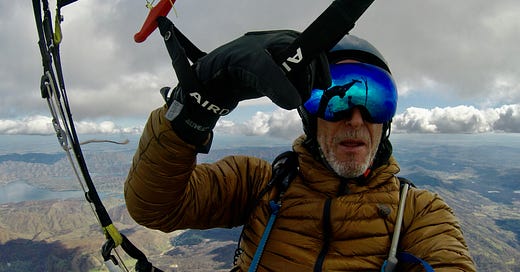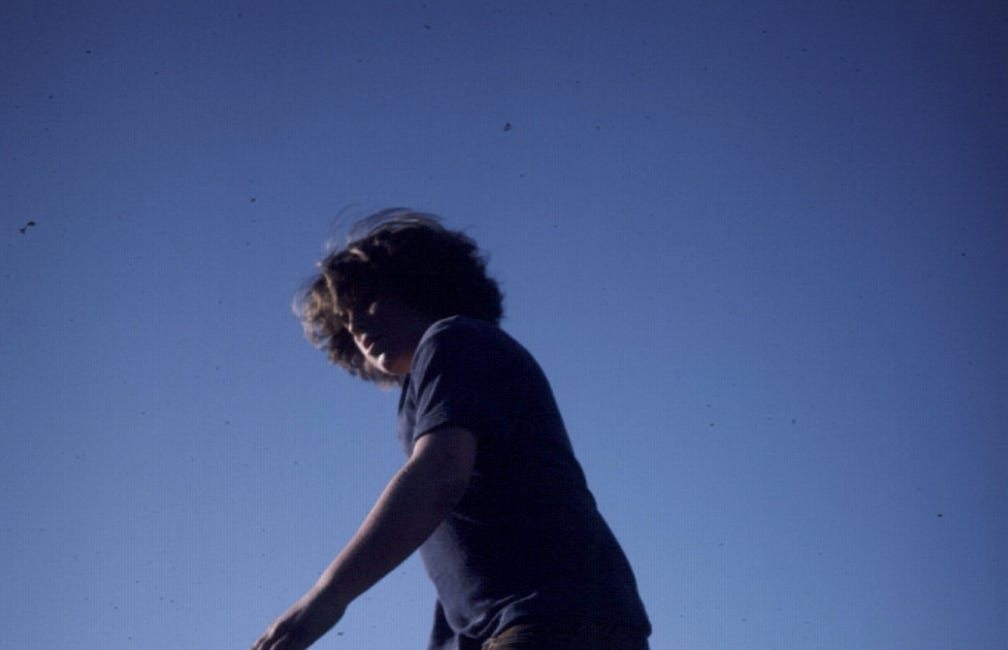This is part of my book-length memoir AN ORDINARY DISASTER, one man's proof that despite what may seem like our inability to hear it, we can all learn to listen to ourselves, and to act upon the inner voice of our self, our sanity and our soul.
My face twists with disdain at the weak and false reassurance of any platitude. They may be offered with the intention to soothe, with an answer—any answer—but these careless, easy, empty lines show a lack of listening, a lack of insight, and a lack of attention. Receiving one of these hollow clichés feels like being smacked in the sauce with an wet, smelly sock. It’s a smothering form of mothering—a silencing, and a cowardly way of saying “I don’t know, and so, please shut up.”
The heat of my inquiry refuses to be placated. There’s a hole in my heart, and it hurts.
My mother often offered me this kind of stale, old bread. I’m sure she meant no harm, but her lame replies starved me for love and truth. It was always obvious to me that these are the lies we tell when we don’t know how to better approach the “insoluble problem of being a person in the world,” as
put it. Not that it was for my mother—or father—to solve that problem for me, but it was a shame to see them not knowing, themselves. Or so it seemed.Yet another wad of cheap chewing gum, another oversized corner-store candy bar; the Kool-Aid and the Peanut Captain Crunch and the Atari console that we didn’t have as kids but that were fed to me anyhow in the form of the infantile, idiotic, and incomplete idea that I could be “anything I want,” or that everything “would be OK,” even though “life isn’t fair.” Lacking explanation or instructions, all of this sounded misleading—and dumb.
I knew they were lying, and so did they—not because these things aren’t true, but because they aren’t the whole truth. Thanks so much to what my parents did teach me, I never doubted my ability to get things done, but I had no faith in the longer run of years.
You can be anything—or anyone—you want to be, provided that you begin as someone. Lacking that foundation, there is no ground for growth. Instead of a burning shore, it’s a wasteland. When I looked inside, I could not locate a solid center. I lacked soul confidence.
Over time though, simply by paying more attention—and by learning that I actually preferred not to dull my senses, and by writing down my thoughts, and by taking myself outside more and more—no longer running from anything, but running in the wild, in the mountains, in the woods, running everywhere I went—and by not skipping over messages when they did surface, I did finally learn to pay attention to the voice that was speaking my self. As I did, I began to feel a subtle warmth rising up and filling some of the holes that had always felt like part of me.
No wonder my father loved Swiss cheese. I can’t even find the stuff he liked any longer; tasty—and so full of holes that half the weight of each block was missing. Half cheese—and half empty space.
The warm feeling in my chest is what I got in exchange for finally paying attention to the part of myself that speaks without words. That glow is the unconscious saying “thank you for listening”—and it’s a feeling that invites the ear to turn still closer. This warmth of gratitude for being heard is what it feels like to be someone, and it’s what I’d been missing all along.
This way of listening is part of what we must teach our children. It may be the first thing we must teach them. It may be the only thing we need to teach them.
Since I did not learn early on, I had to teach myself. I’ve had many lessons—many lovers, many brothers, many books, many journeys—and, when I think about where I’ve learned the most, most of all, it’s been while running, and writing. Just as Murakami only stopped smoking because he had taken up running, in the end, it was wanting to run that got me pointed in the right direction.
It wasn’t so much that I got to the point that I had to quit doing things that didn’t feed me—I did, but more than stopping, it was that I started doing things that I liked better than erasing, forgetting, and escaping. When I did quit, it came last—or almost last—because the one thing that came after quitting drinking was that I fully remembered my long-held goal of becoming a writer, and finally began to pursue that transformation.
And so: first running, and better health, then sobriety, and finally writing. That final call came forwards more and more in my late forties, but it was not entirely clear until May of 2019, when the words “I’m here to tell the truth” rose up from deep within. I’d known that I wanted to write, but it wasn’t until then that I realized that I had to “sing from the very wound that you’ve worked so hard to hide,” as Toko-Pa Turner puts it. I began then to write myself into existence.
The result of all of that running and writing—and many other things—is that I trust myself now. Now I know, not from someone else’s bullshit rhyme, but from my own lived experience, that things do tend to work out—and damn well, in fact—and that is what gives me real confidence. Life has only gotten better over time, and the more I pay attention to the subtle signs, the more often I am delighted—and not entirely surprised—at how it’s even better than I could have imagined.
Now, all of those long-dead clichés feel true, not because I think that I can be President, or an astronaut, or a movie star, but because I have proven to myself that I am capable. Not of everything, but, yes, of anything. I never have before, but if the need arises, let there there be no doubt: I can fly that plane.
That inner voice—call it intuition, call it the voice of self, call it whatever—that was the voice that was missing, and once I learned to hear it, I finally felt that I could not only go with confidence, but I was willing to do so, alone—as we all have to, in the end.
The fear is gone.
This is part of my book-length memoir AN ORDINARY DISASTER, one man's proof that despite what may seem like our inability to hear it, and all of our attempts to avoid it, we can all learn to listen to ourselves, and to act upon the inner voice of our self, our sanity and our soul.
Especially if you’ve been following my work with interest, now is the time to become a paying subscriber. Your commitment will show your appreciation for the work I’m doing here, and your support as I move into the next chapter of the book’s journey.
Further reading
Belonging: Remembering Ourselves Home — Toko-pa Turner
Chapter 5 — How I Stopped Trusting My Father
Report cards weren’t a big ceremony in our house, but one from eighth grade still stands out. I made a point of intercepting it from the incoming mail, not so much because I was afraid of my parents’ reaction, but because I wanted to see the stats for myself first.
Anxious Masculinity—How Things Fall Apart
The phrase “Things Fall Apart” has been stuck in my head since I read Chinua Achebe’s novel in my first year at Cal Berkeley. Looking back at my 1990 transcript, I took Development Studies, Scandinavian Culture, South Asian Literature, Acting, Linguistics, and even something called “Writing,” along with many courses from my major in geography. I was int…
I’ve got some questions for you
What are some of the awful clichés that you’ve heard most often?
Are there any of these platitudes that have served you?
Was there a particular time, or way, that you started feeling like someone?
Can you fly that plane?
Please share, comment, restack, recommend, and click the little ♡ heart right there 👇🏻 if you dig this piece. I’d love to hear from you!






Great piece Bowen. I remember feeling like everyone was lying to me as a kid, and I like this perspective into why.
I do have to say thought, I really wanted to see you flying the plane.
Your life’s story arc is so inspiring to me... I’m definitely on some of the same paths. I’d say I’m not sure about flying the plane. That kind of self-confidence has been thoroughly stamped out of me. But I aim to piece it back together, and I think writing will be a big part of that work.
Growing up in the church you hear constant cliches; the platitudes are endless and everywhere. The problem is, unlike most secular phrases that are simply empty, even the plainest truisms in the church stand on a whole body of tradition and authority to explain and justify them. There were always answers to everything, to whatever level of detail you wanted. Everything was explained perfectly -- and none of it made perfect sense. But we were supposed to accept that mystery first and foremost (“God’s ways are higher than our ways”), and perniciously, the Christians are right on that front. We don’t and won’t know everything. We do have to learn to accept things we can’t understand. But we don’t therefore have to accept the church’s version of the story. And that’s good news indeed.